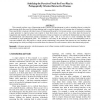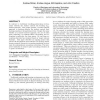906 search results - page 80 / 182 » Games for Learning and Learning from Games |
ICML
2003
IEEE
15 years 11 months ago
2003
IEEE
A satisfactory multiagent learning algorithm should, at a minimum, learn to play optimally against stationary opponents and converge to a Nash equilibrium in self-play. The algori...
ISIPTA
2003
IEEE
15 years 3 months ago
2003
IEEE
We discuss two approaches for choosing a strategy in a two-player game. We suppose that the game is played a large number of rounds, which allows the players to use observations o...
CA
2003
IEEE
15 years 3 months ago
2003
IEEE
This research explores ways of harnessing people’s passion for entertainment in order to stimulate players to attain the meta-learning skills they need for lifelong learning and...
113
click to vote
FPLAY
2008
14 years 11 months ago
2008
In contrast to traditional teaching-and-learning environments whereby the teacher controls the learning (e.g., teacher-centered), video games present a learner-centered approach t...
RSKT
2009
Springer
15 years 4 months ago
2009
Springer
A game-theoretic approach for learning optimal parameter values for probabilistic rough set regions is presented. The parameters can be used to define approximation regions in a p...


